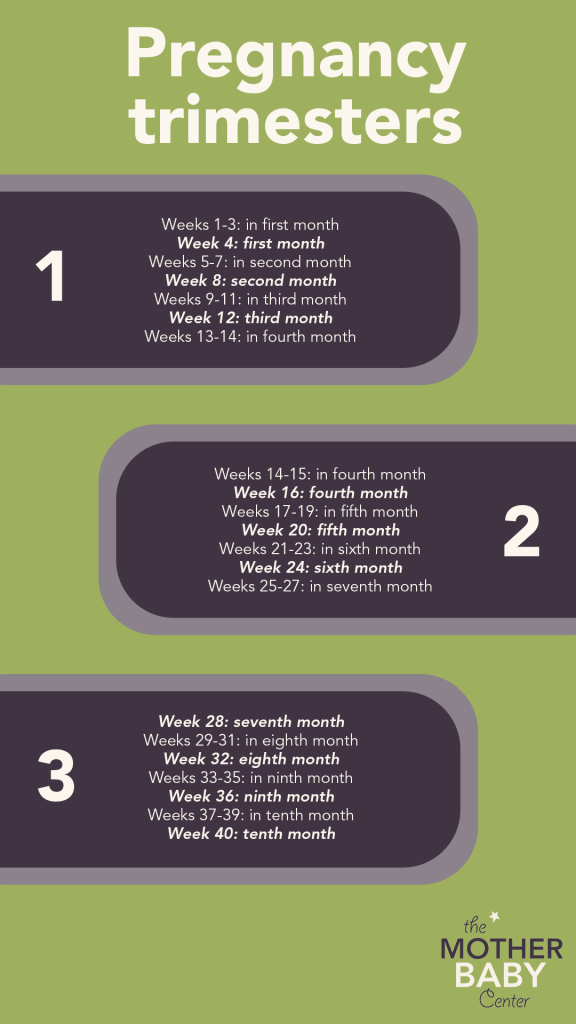Read this post in: Español
Most people know the pregnancy months can be broken into trimesters but tracking how far along you are in your pregnancy can be confusing, especially for first-time parents. A month-to-month breakdown of pregnancy and learning how to calculate your pregnancy from weeks to months can help! Learning how to count weeks pregnant to how long are pregnancy trimesters can help you learn what to expect and how to prepare for delivery at The Mother Baby Center.
The two most common ways for confirming pregnancy is through an at-home urine test or a blood test that can be done by a doctor. If you take a pregnancy test at home and it comes back positive, you can still see a doctor to confirm and it is recommended if you have had a high-risk pregnancy (e.g., tubal pregnancy) in the past.

Ensure your child’s health with a caring, and experienced physician, and find a provider today.
Calculating pregnancy weeks to months
Once your pregnancy is confirmed, the next step would be calculating how far along you are. There are a few common ways of calculating how far along you are in your pregnancy:
- Determining your last period: Count how many days or weeks has passed since the first day of your last menstrual period.
- Get an ultrasound: Get an ultrasound done so your doctor can make an estimate based on the size of the embryo or fetus.
When does pregnancy start?
Contrary to popular belief, pregnancy does not start at conception. So, when does pregnancy start counting?
The pregnancy timeline and stages actually start on the first day of your last menstrual period (LMP). This means that pregnancy actually ends up being 40 weeks or 10 months long!

Explore The Mother Baby Center locations and find the perfect place to welcome a baby to your family.
How long is pregnancy in weeks?
The 10 months of pregnancy break down into 40 weeks or 280 days. The 40 weeks of a full-term pregnancy can be further broken down into three trimesters:
- First trimester: 3.5 months or 14 weeks
- Second trimester: 3.5 months or 14 weeks
- Third trimester is: 3 months or 12 weeks
First trimester pregnancy in weeks
The first trimester is weeks 1-14. During the first trimester, both your and your baby’s body will be changing rapidly. It can be an overwhelming time emotionally and physically, especially for first-time moms and parents. This is also when many expecting moms experience symptoms such as fatigue, nausea, morning sickness and more.
Early on in the first trimester, your first prenatal visit should be scheduled to make sure that you and your baby are going to have a healthy pregnancy.
Find expert care for your pregnancy and schedule your first prenatal visit.
At The Mother Baby Center, we understand that it can seem like you have a million things to do over the course of the months that you’re pregnant. Normal weeks of pregnancy can fly by, and it can feel like there is too much to do and not enough time. Knowing what to expect throughout each week in a trimester of pregnancy can help you prepare, especially if you have a checklist of to-dos to guide you.
- Weeks 1-3: During the first three weeks of pregnancy, you will have just been pregnant for a little under a month. Although doctors count back to the first day of your last period when counting weeks pregnant, the first two weeks you are actually not pregnant yet because you are still on your period. It is after the second week that conception, where the egg and sperm meet, will happen. During your third week of pregnancy, your baby will look like a little ball of cells.
- Weeks 4-6: In weeks four through six, you will have been pregnant for just under two months. A lot will change during this time period. Your baby will grow from a little ball of cells to forming a brain, organs, a spinal cord and skin.
- Weeks 7-9: By the end of week nine, you will be entering your third month of pregnancy. These weeks will also be full of rapid growth for the baby. You can expect your baby to have developed more features such as its head, nose and limbs.
- Weeks 10-14: Congratulations! You are in the third month of pregnancy and almost done with your first trimester! During these last few weeks of the first trimester, you can expect your baby to be able to bend its limbs, make and release urine and develop genitals and fingernails.
Learn what to include in your birth plan to feel prepared no matter which type of delivery you choose.
Second trimester pregnancy in weeks
You’ve made it to your second trimester! The second trimester is considered to be weeks 14-28. During this trimester is when expecting moms find that they feel less nauseated and their energy levels have returned.
When it comes to the arrival of babies, nothing is guaranteed. During this trimester is typically when you should start planning and considering where and how you want to give birth. There are five common delivery methods that should be explored so you can begin creating a birth plan with your partner.
We understand that life can get busy and it can be hard to plan for the day you welcome your bundle of joy into this world. The Mother Baby Center has made it easy for you to take a virtual tour of our three convenient locations in the Twin Cities metro area.
Now that you’ve crossed off the two most important to-do items, check out what else is recommended in a second trimester to-do list for expecting parents.
- Weeks 14-15: During weeks 14-15, you should be working your way through your third month of pregnancy. In these coming weeks, your baby will develop their scalp or hair patterns and stronger bones.
- Weeks 16-18: Welcome to one of the most exciting weeks of pregnancy! Weeks 16-18 means that you have started your fourth month of pregnancy. During these weeks, you can expect your baby to be able to move their eyes, develop toenails and hear sounds. Starting week 18 is also when mid-pregnancy ultrasounds are scheduled and if you choose to know, you can find out the gender of your baby!
- Weeks 19-21: Congratulations! You are a little over halfway pregnant, or five months, by the end of week 20. During this period, you can expect your baby to move more.
- Weeks 22-24: By the start of week 24, you are entering your sixth month of pregnancy. In weeks 22-24, your baby has begun to develop hair, fingerprints and footprints.
- Weeks 25-28: You’ve made it to the last four weeks of your second trimester are halfway through your sixth month of pregnancy! This is another exciting point of pregnancy because your baby will now be able to hear you talk!
Double check your third-trimester checklist so your family is ready when it’s time to bring your little one home.
Third trimester pregnancy in weeks
Congratulations! You’ve made it to your last trimester. The third trimester is the shortest, and includes weeks 28-40. We’re sure you’re feeling all kinds of emotions now that you get to meet your baby soon!
During these last few months, it is time to organize everything before your baby gets here. Your third trimester to-do list consists of things such as what to pack in your hospital bag, so that you feel prepared and can focus on your baby when the day comes.
As a new mom, feeding your baby can be a confusing experience. Some babies love being breastfed and latch on easily while others prefer bottles. Something to consider during your stay at The Mother Baby Center is meeting with a lactation consultant to answer any questions you may have on feeding your baby successfully.
- Weeks 28-30: Hooray! You’re in the third and final trimester! At this point, you should be about seven months pregnant. According to Allina Health, you can expect your baby to grow more hair and start kicking and stretching in these next couple of weeks.
- Weeks 31-33: During weeks 31-33, you should’ve started your eighth month of pregnancy. At this time, your baby will have completed their major developments and will be gaining weight rapidly.
- Weeks 34-36: At the end of week 36, you will be nine months pregnant. Your baby will go through some final development, such as skin smoothing out and fully growing out their nails.
- Weeks 37-40: You’re at the home stretch! At this point, you should be working through your ninth month of pregnancy and your baby could come any day.

Learn about gender-inclusive parenting, the increasingly popular parenting method.
When is delivery considered premature or late?
According to Allina Health, any baby born before week 37 or nine months is considered premature. The earlier your baby is born, the higher risk of complications and the more likely they will need specialized care. Babies born before 28 weeks or seven months are at a higher risk to having lasting complications into adulthood.
If your pregnancy goes past 41 weeks or 10 months, you are considered late. At this point, your doctor may start trying some techniques to try to induce labor and if none of the techniques work, a cesarean delivery, or C-section, may be considered.
Common health concerns for premature or late babies
It is common for babies born before 25 weeks to weigh one pound or less. If your baby is premature, you may also notice that your baby has less body fat and some breathing problems.
A common health concern for a late baby is the size. If inducing labor doesn’t work, a c-section may have to be performed. There are also concerns with the baby’s heart rate due to it being stressed or low amniotic fluid, the fluid that surrounds the baby during pregnancy. Learn more about other health concerns with late babies from Allina Health.
Learn what to expect during the fourth trimester and the initial postpartum period for your recovery and your baby’s health.
What is the postpartum period?
Postpartum is the 6-8 weeks after giving birth. During the postpartum period, bonding with your newborn will be one of the most important things you will have to do. Bonding is the special attachment that forms between newborns and their parents. Not everyone will have an instant connection with their newborn and that is okay. It is normal for the bonding process to take longer for some people and your bond with your newborn will naturally build as you take care of them.
Although not everyone will experience it, one in five women will experience some form of postpartum depression during this time period. Some symptoms to look out for are sadness, anxiety, lack of interest in your baby and more.
Everyone experiences postpartum depression differently and at different degrees of severity. If you are having a hard time with managing these symptoms at home, please reach out to a therapist or health care provider. Remember that you are not alone and that these symptoms are common and treatable.
Holistic care during each month of pregnancy at The Mother Baby Center
Pregnancy can be both an amazing and stressful experience. Not only do you have what seems like a million things to do during the next 40 weeks, but you also have to track your pregnancy. Tracking your pregnancy can be confusing at first, but once you get the hang of it, it can help prepare you for what to expect.
From the first week of pregnancy to the weeks after your baby arrives, The Mother Baby Center has expert care to support you and your family. The holistic approach to care ensures that your family feels safe, reassured and ready for delivery and the journey into parenthood. Find a pediatrician that’s right for you and be ready for delivery at The Mother Baby Center.
Did you receive care at The Mother Baby Center?
We’d love to hear from you!